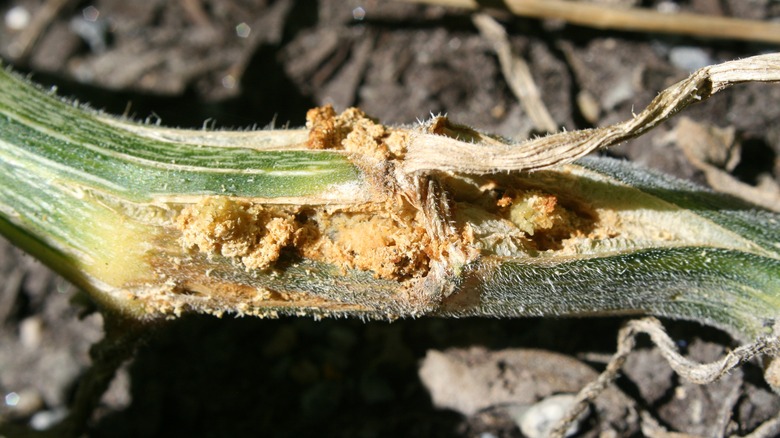How To Protect Pumpkins From Vine Borers In The Garden
Vine borers can't resist the allure of pumpkin plants. These pesky insects make their way into the heart of your pumpkin vines and suck out the essential nutrients and moisture, seriously damaging or even killing the plant. If you've spotted signs of vine borer damage, such as wilting vines or noticeable frass (excrement), you're likely seeking immediate solutions. While you have several options for combating these destructive invaders — from digging them out manually to covering your plants with netting or even employing pesticides — prevention is unquestionably the best policy. The ideal situation is to stop these critters from ever hatching or, better yet, cultivate pumpkin varieties that are naturally resistant to them.
Understanding the scale of the problem is crucial. In a single season, one adult female vine borer can lay 150 eggs. What starts as a single moth could put your entire garden at risk. And it's not just pumpkins they go for; these borers are indiscriminate in their choice of plants. Now, you may be wondering: How do you spot these unwelcome guests? Early identification is key to effective control. Vine borer eggs are brown in color and often strategically placed near the plant's base. Once hatched, they become larvae that work their way into the vine. Adult vine borers are more conspicuous with their orange abdomens and metallic green wings. Yet, by the time you notice them, they may have already caused significant damage.
Possible ways to eliminate vine borers
One of the most hands-on ways to address vine borers on pumpkins is what some gardeners call "vine surgery," which involves carefully cutting into the vine to remove the offender. Take a small knife and carefully cut down the infested portion of the stem. The cut should be lengthwise, not across. This approach minimizes damage and makes locating and dealing with the borer easier. Once you've opened up the vine, extract the vine borer or kill it. Then, bury the cut section of the vine back into the soil to encourage the growth of new roots. It's a bit labor-intensive but can be incredibly effective. Now, if you're not keen on playing surgeon to your plants, another option is to use netting to cover your pumpkin vines. While effective, netting keeps out the vine borers as well as pollinators. So, prepare to act as a stand-in for the bees and do some manual pollination.
Lastly, pesticides offer a solid defense if you're looking for the most effective, albeit chemical, route. Carbaryl is among the most effective pesticides for tackling vine borers. Be sure to apply it early in the season and follow the manufacturer's guidelines to get the best results while keeping safety in mind. Each method has its pros and cons, but they all aim to save your pumpkin vines from destruction. Choose the one that best aligns with your gardening philosophy and the time you can dedicate to pest control.
Prevention: The best cure
While prevention is always the best option, it's not always as simple as one-and-done. In other words, you'll likely need to use multiple methods in tandem to effectively keep vine borers at bay. Monitor your garden for signs of vine borer eggs, keeping an eye mainly on the base of your pumpkin plants. The eggs hatch quite rapidly, often in less than a week. So, consistent vigilance is the name of the game here. The sooner you can identify and remove these eggs, the better your chances of preventing an infestation. Another layer of your preventative strategy can be cultivating resistant varieties like Cucurbita moschata. These are inherently less appealing to vine borers, giving you a leg up in your ongoing battle against these pests.
But suppose you're particularly averse to the idea of picking vine borers in your garden. In that case, you might also consider wrapping your pumpkin's stems with aluminum foil. This physical barrier prevents the vine borer from getting to the stem, making it impossible for them to lay eggs. Given the manual labor involved, this is more effective if you have a smaller garden or fewer plants to manage. You can also consider crop rotation. If you've dealt with vine borers in the past, moving your plants to a different area of your garden can be helpful to disrupt their life cycle.


